Analysis of Leadership, Recruitment, and Teamwork at UPS Company
VerifiedAdded on 2020/01/28
|20
|6651
|497
Report
AI Summary
This report provides a comprehensive analysis of leadership, recruitment, and teamwork within the UPS Company. It begins by examining the selection and recruitment processes, emphasizing the importance of a strict and monitored approach by the HR manager, including detailed steps such as profile positioning, job description preparation, and candidate screening. The report then delves into the impact of legal, regulatory, and ethical considerations, highlighting the significance of adhering to employment laws and ethical practices to ensure fairness and attract qualified candidates. Different leadership styles and their effects are explored, along with strategies for motivating staff and fostering effective teamwork. The report also addresses the benefits of team working, the importance of teamwork for leaders and members, and factors involved in planning, monitoring, and assessing work performance, including development needs and the success of assessment processes. The report concludes with recommendations for improving leadership and human resource management practices at UPS.
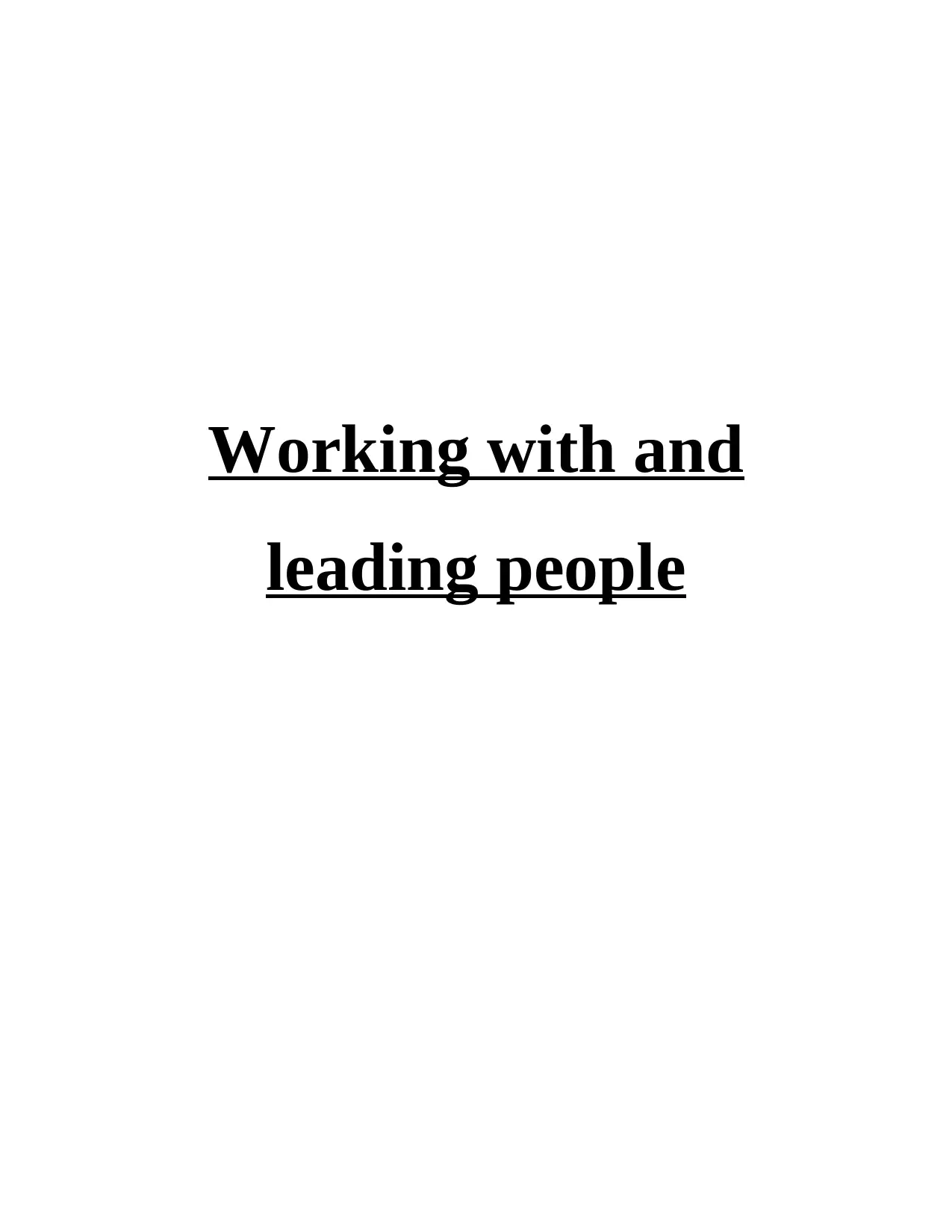
Working with and
leading people
leading people
Paraphrase This Document
Need a fresh take? Get an instant paraphrase of this document with our AI Paraphraser
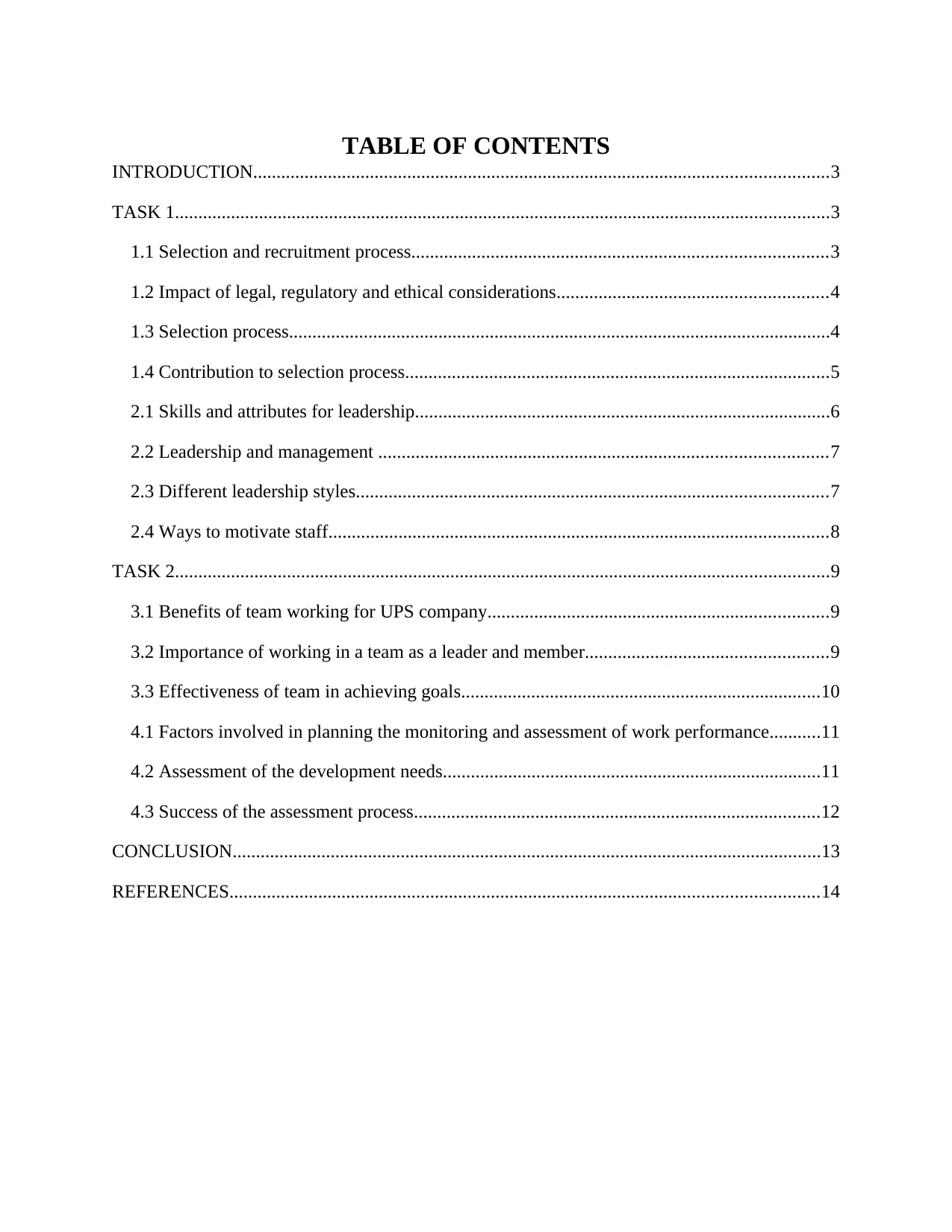
TABLE OF CONTENTS
INTRODUCTION...........................................................................................................................3
TASK 1............................................................................................................................................3
1.1 Selection and recruitment process.........................................................................................3
1.2 Impact of legal, regulatory and ethical considerations..........................................................4
1.3 Selection process....................................................................................................................4
1.4 Contribution to selection process...........................................................................................5
2.1 Skills and attributes for leadership.........................................................................................6
2.2 Leadership and management ................................................................................................7
2.3 Different leadership styles.....................................................................................................7
2.4 Ways to motivate staff...........................................................................................................8
TASK 2............................................................................................................................................9
3.1 Benefits of team working for UPS company.........................................................................9
3.2 Importance of working in a team as a leader and member....................................................9
3.3 Effectiveness of team in achieving goals.............................................................................10
4.1 Factors involved in planning the monitoring and assessment of work performance...........11
4.2 Assessment of the development needs.................................................................................11
4.3 Success of the assessment process.......................................................................................12
CONCLUSION..............................................................................................................................13
REFERENCES..............................................................................................................................14
INTRODUCTION...........................................................................................................................3
TASK 1............................................................................................................................................3
1.1 Selection and recruitment process.........................................................................................3
1.2 Impact of legal, regulatory and ethical considerations..........................................................4
1.3 Selection process....................................................................................................................4
1.4 Contribution to selection process...........................................................................................5
2.1 Skills and attributes for leadership.........................................................................................6
2.2 Leadership and management ................................................................................................7
2.3 Different leadership styles.....................................................................................................7
2.4 Ways to motivate staff...........................................................................................................8
TASK 2............................................................................................................................................9
3.1 Benefits of team working for UPS company.........................................................................9
3.2 Importance of working in a team as a leader and member....................................................9
3.3 Effectiveness of team in achieving goals.............................................................................10
4.1 Factors involved in planning the monitoring and assessment of work performance...........11
4.2 Assessment of the development needs.................................................................................11
4.3 Success of the assessment process.......................................................................................12
CONCLUSION..............................................................................................................................13
REFERENCES..............................................................................................................................14
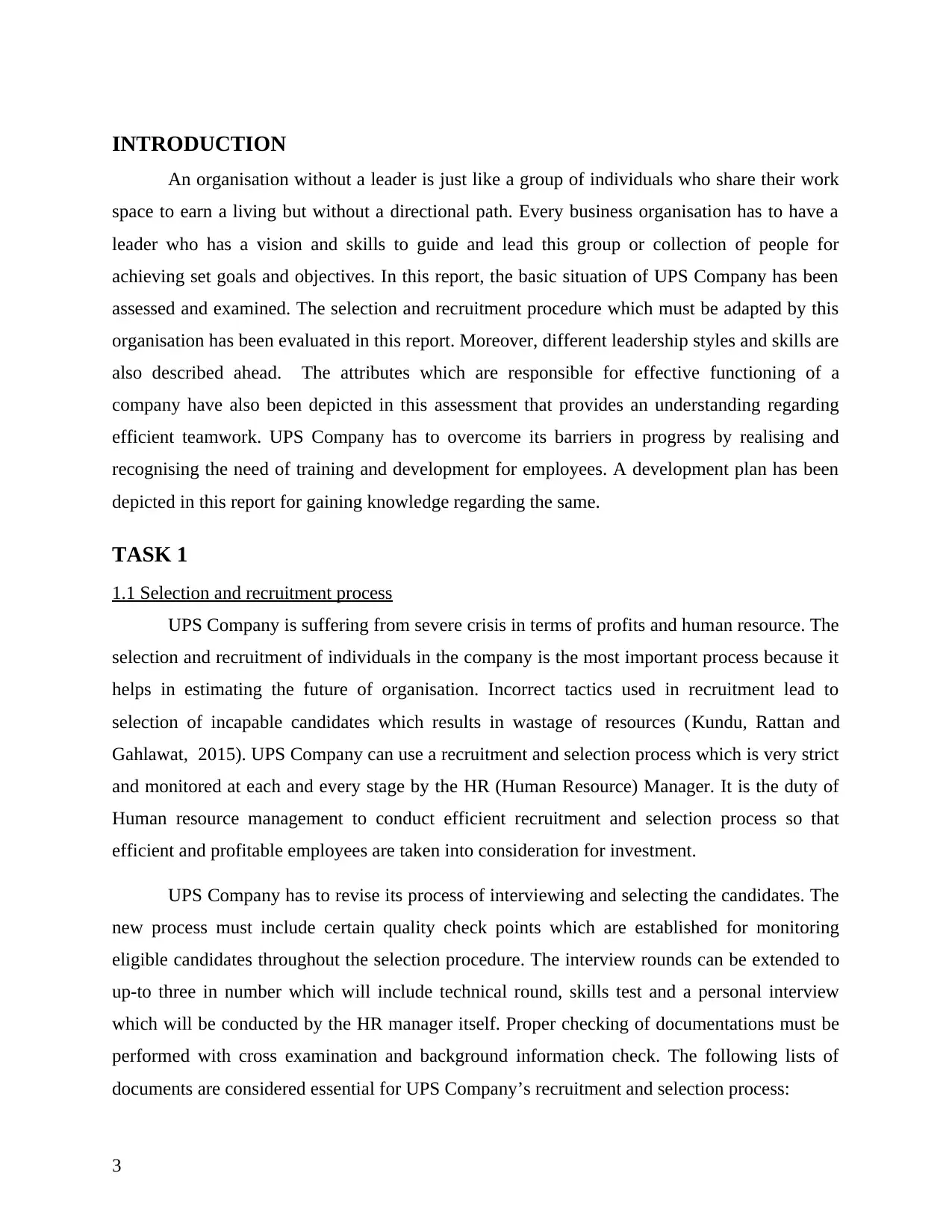
INTRODUCTION
An organisation without a leader is just like a group of individuals who share their work
space to earn a living but without a directional path. Every business organisation has to have a
leader who has a vision and skills to guide and lead this group or collection of people for
achieving set goals and objectives. In this report, the basic situation of UPS Company has been
assessed and examined. The selection and recruitment procedure which must be adapted by this
organisation has been evaluated in this report. Moreover, different leadership styles and skills are
also described ahead. The attributes which are responsible for effective functioning of a
company have also been depicted in this assessment that provides an understanding regarding
efficient teamwork. UPS Company has to overcome its barriers in progress by realising and
recognising the need of training and development for employees. A development plan has been
depicted in this report for gaining knowledge regarding the same.
TASK 1
1.1 Selection and recruitment process
UPS Company is suffering from severe crisis in terms of profits and human resource. The
selection and recruitment of individuals in the company is the most important process because it
helps in estimating the future of organisation. Incorrect tactics used in recruitment lead to
selection of incapable candidates which results in wastage of resources (Kundu, Rattan and
Gahlawat, 2015). UPS Company can use a recruitment and selection process which is very strict
and monitored at each and every stage by the HR (Human Resource) Manager. It is the duty of
Human resource management to conduct efficient recruitment and selection process so that
efficient and profitable employees are taken into consideration for investment.
UPS Company has to revise its process of interviewing and selecting the candidates. The
new process must include certain quality check points which are established for monitoring
eligible candidates throughout the selection procedure. The interview rounds can be extended to
up-to three in number which will include technical round, skills test and a personal interview
which will be conducted by the HR manager itself. Proper checking of documentations must be
performed with cross examination and background information check. The following lists of
documents are considered essential for UPS Company’s recruitment and selection process:
3
An organisation without a leader is just like a group of individuals who share their work
space to earn a living but without a directional path. Every business organisation has to have a
leader who has a vision and skills to guide and lead this group or collection of people for
achieving set goals and objectives. In this report, the basic situation of UPS Company has been
assessed and examined. The selection and recruitment procedure which must be adapted by this
organisation has been evaluated in this report. Moreover, different leadership styles and skills are
also described ahead. The attributes which are responsible for effective functioning of a
company have also been depicted in this assessment that provides an understanding regarding
efficient teamwork. UPS Company has to overcome its barriers in progress by realising and
recognising the need of training and development for employees. A development plan has been
depicted in this report for gaining knowledge regarding the same.
TASK 1
1.1 Selection and recruitment process
UPS Company is suffering from severe crisis in terms of profits and human resource. The
selection and recruitment of individuals in the company is the most important process because it
helps in estimating the future of organisation. Incorrect tactics used in recruitment lead to
selection of incapable candidates which results in wastage of resources (Kundu, Rattan and
Gahlawat, 2015). UPS Company can use a recruitment and selection process which is very strict
and monitored at each and every stage by the HR (Human Resource) Manager. It is the duty of
Human resource management to conduct efficient recruitment and selection process so that
efficient and profitable employees are taken into consideration for investment.
UPS Company has to revise its process of interviewing and selecting the candidates. The
new process must include certain quality check points which are established for monitoring
eligible candidates throughout the selection procedure. The interview rounds can be extended to
up-to three in number which will include technical round, skills test and a personal interview
which will be conducted by the HR manager itself. Proper checking of documentations must be
performed with cross examination and background information check. The following lists of
documents are considered essential for UPS Company’s recruitment and selection process:
3
⊘ This is a preview!⊘
Do you want full access?
Subscribe today to unlock all pages.

Trusted by 1+ million students worldwide
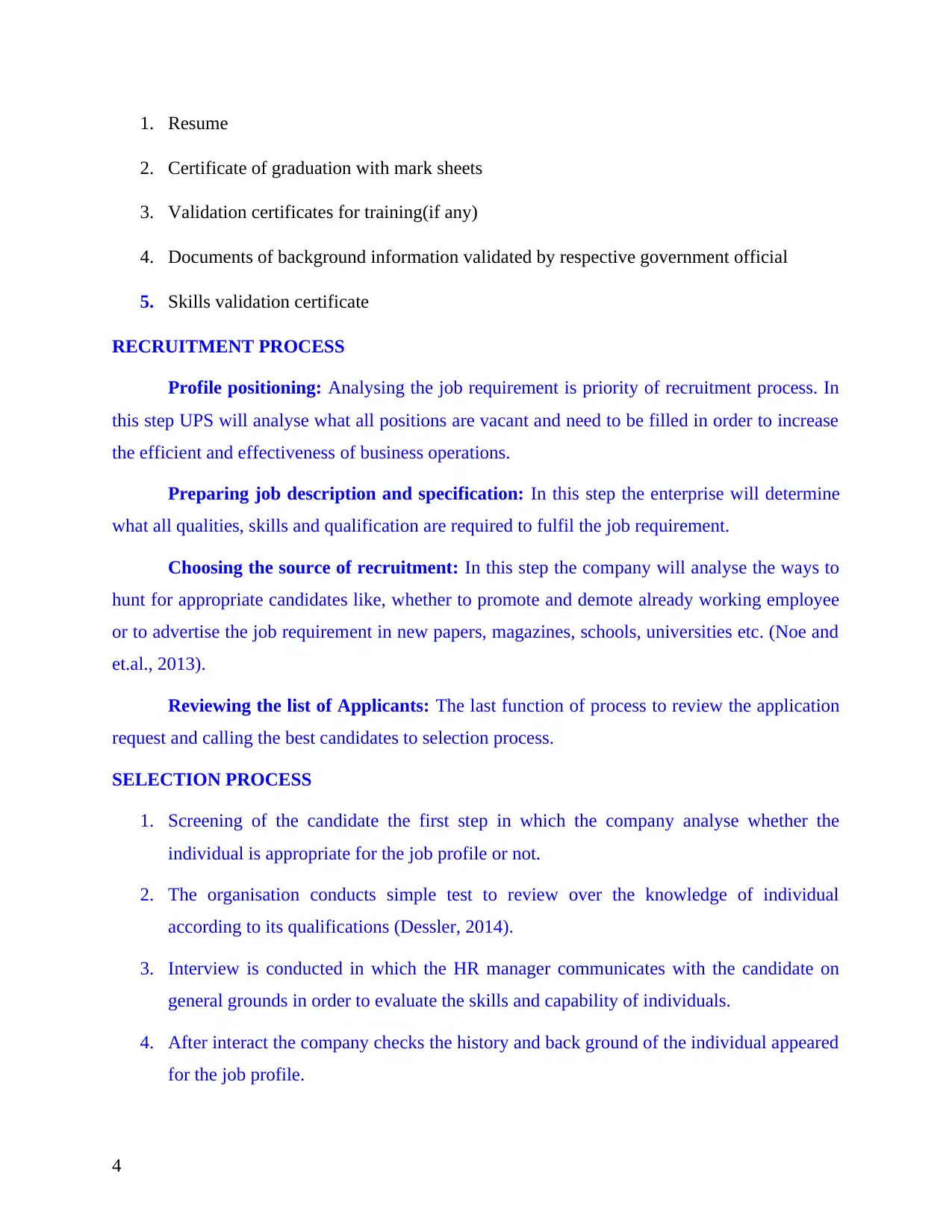
1. Resume
2. Certificate of graduation with mark sheets
3. Validation certificates for training(if any)
4. Documents of background information validated by respective government official
5. Skills validation certificate
RECRUITMENT PROCESS
Profile positioning: Analysing the job requirement is priority of recruitment process. In
this step UPS will analyse what all positions are vacant and need to be filled in order to increase
the efficient and effectiveness of business operations.
Preparing job description and specification: In this step the enterprise will determine
what all qualities, skills and qualification are required to fulfil the job requirement.
Choosing the source of recruitment: In this step the company will analyse the ways to
hunt for appropriate candidates like, whether to promote and demote already working employee
or to advertise the job requirement in new papers, magazines, schools, universities etc. (Noe and
et.al., 2013).
Reviewing the list of Applicants: The last function of process to review the application
request and calling the best candidates to selection process.
SELECTION PROCESS
1. Screening of the candidate the first step in which the company analyse whether the
individual is appropriate for the job profile or not.
2. The organisation conducts simple test to review over the knowledge of individual
according to its qualifications (Dessler, 2014).
3. Interview is conducted in which the HR manager communicates with the candidate on
general grounds in order to evaluate the skills and capability of individuals.
4. After interact the company checks the history and back ground of the individual appeared
for the job profile.
4
2. Certificate of graduation with mark sheets
3. Validation certificates for training(if any)
4. Documents of background information validated by respective government official
5. Skills validation certificate
RECRUITMENT PROCESS
Profile positioning: Analysing the job requirement is priority of recruitment process. In
this step UPS will analyse what all positions are vacant and need to be filled in order to increase
the efficient and effectiveness of business operations.
Preparing job description and specification: In this step the enterprise will determine
what all qualities, skills and qualification are required to fulfil the job requirement.
Choosing the source of recruitment: In this step the company will analyse the ways to
hunt for appropriate candidates like, whether to promote and demote already working employee
or to advertise the job requirement in new papers, magazines, schools, universities etc. (Noe and
et.al., 2013).
Reviewing the list of Applicants: The last function of process to review the application
request and calling the best candidates to selection process.
SELECTION PROCESS
1. Screening of the candidate the first step in which the company analyse whether the
individual is appropriate for the job profile or not.
2. The organisation conducts simple test to review over the knowledge of individual
according to its qualifications (Dessler, 2014).
3. Interview is conducted in which the HR manager communicates with the candidate on
general grounds in order to evaluate the skills and capability of individuals.
4. After interact the company checks the history and back ground of the individual appeared
for the job profile.
4
Paraphrase This Document
Need a fresh take? Get an instant paraphrase of this document with our AI Paraphraser
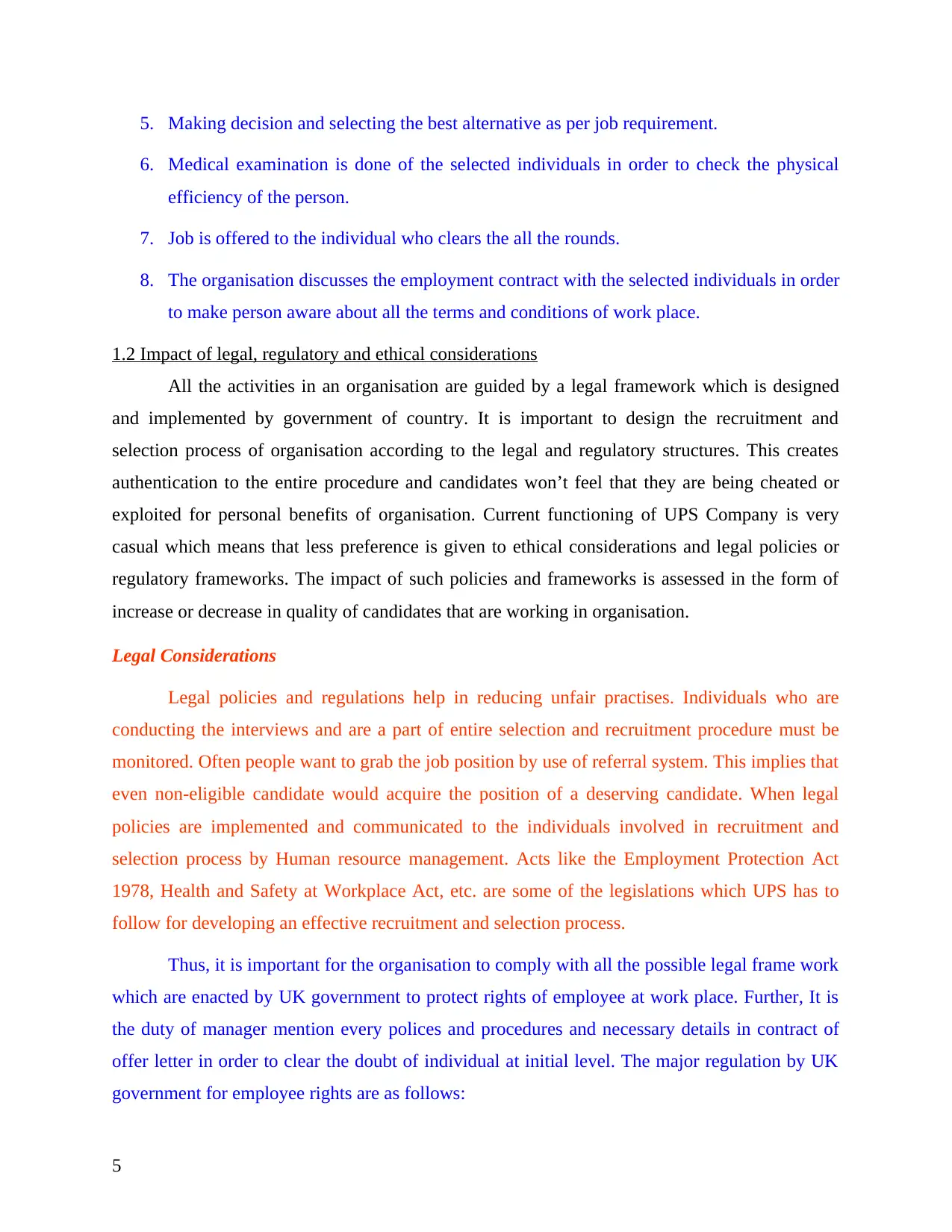
5. Making decision and selecting the best alternative as per job requirement.
6. Medical examination is done of the selected individuals in order to check the physical
efficiency of the person.
7. Job is offered to the individual who clears the all the rounds.
8. The organisation discusses the employment contract with the selected individuals in order
to make person aware about all the terms and conditions of work place.
1.2 Impact of legal, regulatory and ethical considerations
All the activities in an organisation are guided by a legal framework which is designed
and implemented by government of country. It is important to design the recruitment and
selection process of organisation according to the legal and regulatory structures. This creates
authentication to the entire procedure and candidates won’t feel that they are being cheated or
exploited for personal benefits of organisation. Current functioning of UPS Company is very
casual which means that less preference is given to ethical considerations and legal policies or
regulatory frameworks. The impact of such policies and frameworks is assessed in the form of
increase or decrease in quality of candidates that are working in organisation.
Legal Considerations
Legal policies and regulations help in reducing unfair practises. Individuals who are
conducting the interviews and are a part of entire selection and recruitment procedure must be
monitored. Often people want to grab the job position by use of referral system. This implies that
even non-eligible candidate would acquire the position of a deserving candidate. When legal
policies are implemented and communicated to the individuals involved in recruitment and
selection process by Human resource management. Acts like the Employment Protection Act
1978, Health and Safety at Workplace Act, etc. are some of the legislations which UPS has to
follow for developing an effective recruitment and selection process.
Thus, it is important for the organisation to comply with all the possible legal frame work
which are enacted by UK government to protect rights of employee at work place. Further, It is
the duty of manager mention every polices and procedures and necessary details in contract of
offer letter in order to clear the doubt of individual at initial level. The major regulation by UK
government for employee rights are as follows:
5
6. Medical examination is done of the selected individuals in order to check the physical
efficiency of the person.
7. Job is offered to the individual who clears the all the rounds.
8. The organisation discusses the employment contract with the selected individuals in order
to make person aware about all the terms and conditions of work place.
1.2 Impact of legal, regulatory and ethical considerations
All the activities in an organisation are guided by a legal framework which is designed
and implemented by government of country. It is important to design the recruitment and
selection process of organisation according to the legal and regulatory structures. This creates
authentication to the entire procedure and candidates won’t feel that they are being cheated or
exploited for personal benefits of organisation. Current functioning of UPS Company is very
casual which means that less preference is given to ethical considerations and legal policies or
regulatory frameworks. The impact of such policies and frameworks is assessed in the form of
increase or decrease in quality of candidates that are working in organisation.
Legal Considerations
Legal policies and regulations help in reducing unfair practises. Individuals who are
conducting the interviews and are a part of entire selection and recruitment procedure must be
monitored. Often people want to grab the job position by use of referral system. This implies that
even non-eligible candidate would acquire the position of a deserving candidate. When legal
policies are implemented and communicated to the individuals involved in recruitment and
selection process by Human resource management. Acts like the Employment Protection Act
1978, Health and Safety at Workplace Act, etc. are some of the legislations which UPS has to
follow for developing an effective recruitment and selection process.
Thus, it is important for the organisation to comply with all the possible legal frame work
which are enacted by UK government to protect rights of employee at work place. Further, It is
the duty of manager mention every polices and procedures and necessary details in contract of
offer letter in order to clear the doubt of individual at initial level. The major regulation by UK
government for employee rights are as follows:
5
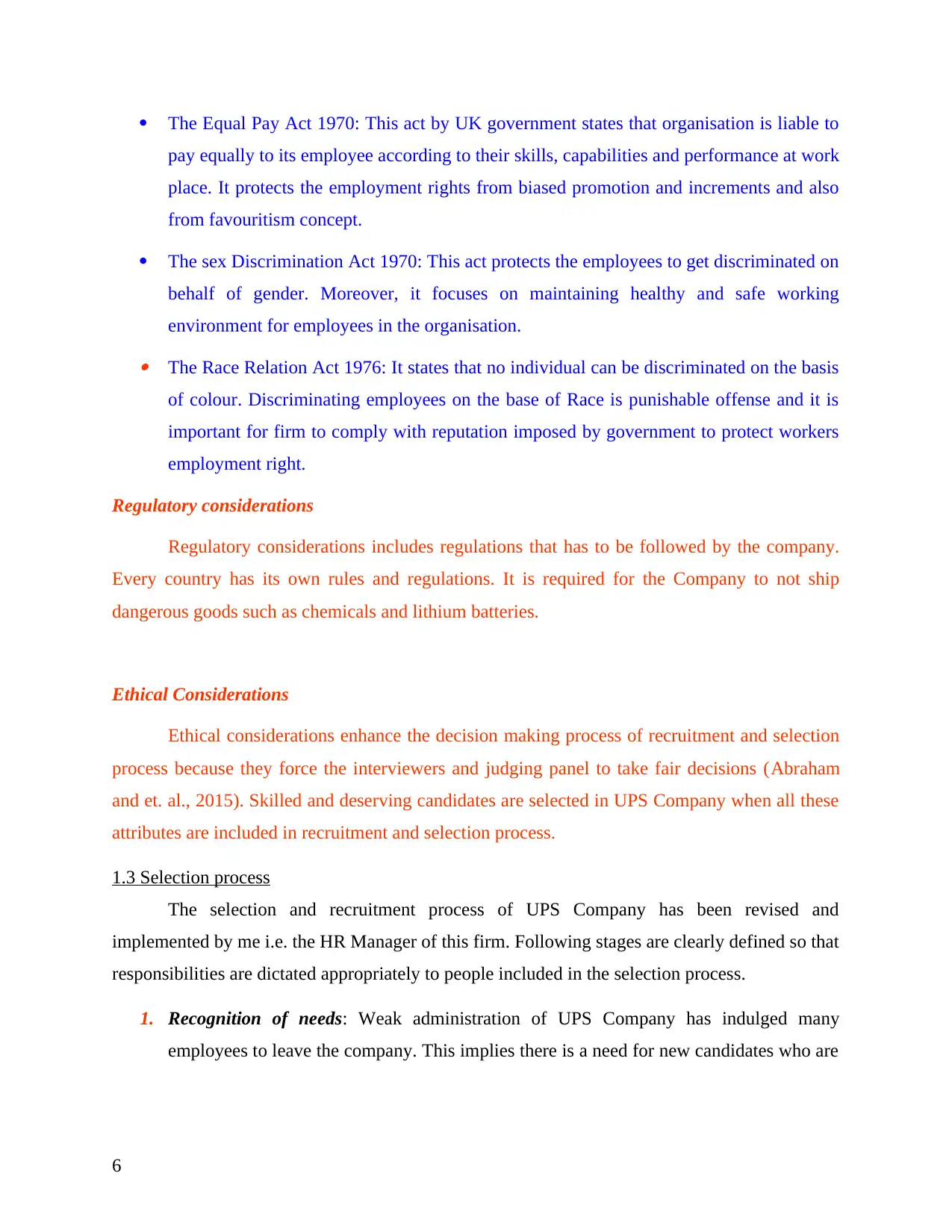
The Equal Pay Act 1970: This act by UK government states that organisation is liable to
pay equally to its employee according to their skills, capabilities and performance at work
place. It protects the employment rights from biased promotion and increments and also
from favouritism concept.
The sex Discrimination Act 1970: This act protects the employees to get discriminated on
behalf of gender. Moreover, it focuses on maintaining healthy and safe working
environment for employees in the organisation. The Race Relation Act 1976: It states that no individual can be discriminated on the basis
of colour. Discriminating employees on the base of Race is punishable offense and it is
important for firm to comply with reputation imposed by government to protect workers
employment right.
Regulatory considerations
Regulatory considerations includes regulations that has to be followed by the company.
Every country has its own rules and regulations. It is required for the Company to not ship
dangerous goods such as chemicals and lithium batteries.
Ethical Considerations
Ethical considerations enhance the decision making process of recruitment and selection
process because they force the interviewers and judging panel to take fair decisions (Abraham
and et. al., 2015). Skilled and deserving candidates are selected in UPS Company when all these
attributes are included in recruitment and selection process.
1.3 Selection process
The selection and recruitment process of UPS Company has been revised and
implemented by me i.e. the HR Manager of this firm. Following stages are clearly defined so that
responsibilities are dictated appropriately to people included in the selection process.
1. Recognition of needs: Weak administration of UPS Company has indulged many
employees to leave the company. This implies there is a need for new candidates who are
6
pay equally to its employee according to their skills, capabilities and performance at work
place. It protects the employment rights from biased promotion and increments and also
from favouritism concept.
The sex Discrimination Act 1970: This act protects the employees to get discriminated on
behalf of gender. Moreover, it focuses on maintaining healthy and safe working
environment for employees in the organisation. The Race Relation Act 1976: It states that no individual can be discriminated on the basis
of colour. Discriminating employees on the base of Race is punishable offense and it is
important for firm to comply with reputation imposed by government to protect workers
employment right.
Regulatory considerations
Regulatory considerations includes regulations that has to be followed by the company.
Every country has its own rules and regulations. It is required for the Company to not ship
dangerous goods such as chemicals and lithium batteries.
Ethical Considerations
Ethical considerations enhance the decision making process of recruitment and selection
process because they force the interviewers and judging panel to take fair decisions (Abraham
and et. al., 2015). Skilled and deserving candidates are selected in UPS Company when all these
attributes are included in recruitment and selection process.
1.3 Selection process
The selection and recruitment process of UPS Company has been revised and
implemented by me i.e. the HR Manager of this firm. Following stages are clearly defined so that
responsibilities are dictated appropriately to people included in the selection process.
1. Recognition of needs: Weak administration of UPS Company has indulged many
employees to leave the company. This implies there is a need for new candidates who are
6
⊘ This is a preview!⊘
Do you want full access?
Subscribe today to unlock all pages.

Trusted by 1+ million students worldwide
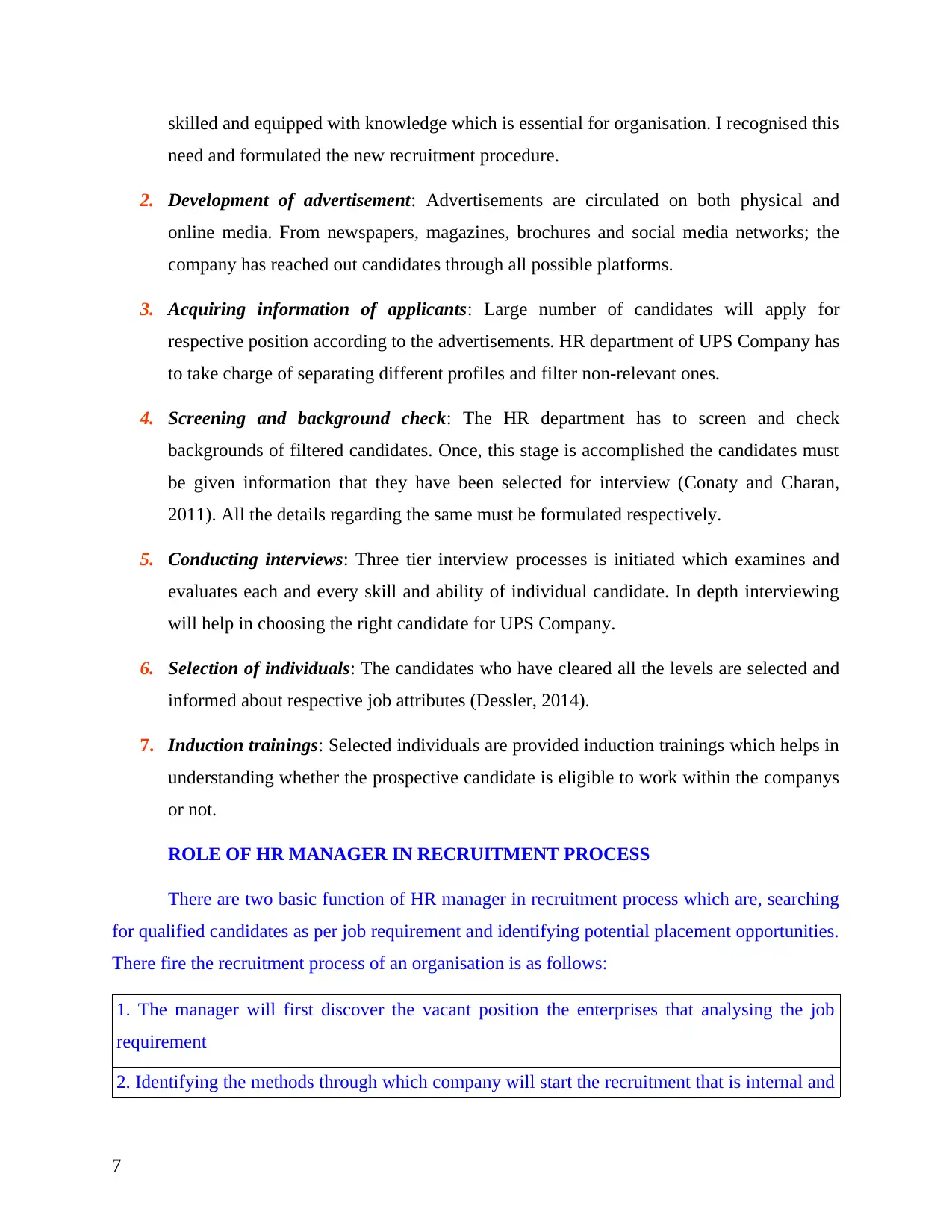
skilled and equipped with knowledge which is essential for organisation. I recognised this
need and formulated the new recruitment procedure.
2. Development of advertisement: Advertisements are circulated on both physical and
online media. From newspapers, magazines, brochures and social media networks; the
company has reached out candidates through all possible platforms.
3. Acquiring information of applicants: Large number of candidates will apply for
respective position according to the advertisements. HR department of UPS Company has
to take charge of separating different profiles and filter non-relevant ones.
4. Screening and background check: The HR department has to screen and check
backgrounds of filtered candidates. Once, this stage is accomplished the candidates must
be given information that they have been selected for interview (Conaty and Charan,
2011). All the details regarding the same must be formulated respectively.
5. Conducting interviews: Three tier interview processes is initiated which examines and
evaluates each and every skill and ability of individual candidate. In depth interviewing
will help in choosing the right candidate for UPS Company.
6. Selection of individuals: The candidates who have cleared all the levels are selected and
informed about respective job attributes (Dessler, 2014).
7. Induction trainings: Selected individuals are provided induction trainings which helps in
understanding whether the prospective candidate is eligible to work within the companys
or not.
ROLE OF HR MANAGER IN RECRUITMENT PROCESS
There are two basic function of HR manager in recruitment process which are, searching
for qualified candidates as per job requirement and identifying potential placement opportunities.
There fire the recruitment process of an organisation is as follows:
1. The manager will first discover the vacant position the enterprises that analysing the job
requirement
2. Identifying the methods through which company will start the recruitment that is internal and
7
need and formulated the new recruitment procedure.
2. Development of advertisement: Advertisements are circulated on both physical and
online media. From newspapers, magazines, brochures and social media networks; the
company has reached out candidates through all possible platforms.
3. Acquiring information of applicants: Large number of candidates will apply for
respective position according to the advertisements. HR department of UPS Company has
to take charge of separating different profiles and filter non-relevant ones.
4. Screening and background check: The HR department has to screen and check
backgrounds of filtered candidates. Once, this stage is accomplished the candidates must
be given information that they have been selected for interview (Conaty and Charan,
2011). All the details regarding the same must be formulated respectively.
5. Conducting interviews: Three tier interview processes is initiated which examines and
evaluates each and every skill and ability of individual candidate. In depth interviewing
will help in choosing the right candidate for UPS Company.
6. Selection of individuals: The candidates who have cleared all the levels are selected and
informed about respective job attributes (Dessler, 2014).
7. Induction trainings: Selected individuals are provided induction trainings which helps in
understanding whether the prospective candidate is eligible to work within the companys
or not.
ROLE OF HR MANAGER IN RECRUITMENT PROCESS
There are two basic function of HR manager in recruitment process which are, searching
for qualified candidates as per job requirement and identifying potential placement opportunities.
There fire the recruitment process of an organisation is as follows:
1. The manager will first discover the vacant position the enterprises that analysing the job
requirement
2. Identifying the methods through which company will start the recruitment that is internal and
7
Paraphrase This Document
Need a fresh take? Get an instant paraphrase of this document with our AI Paraphraser
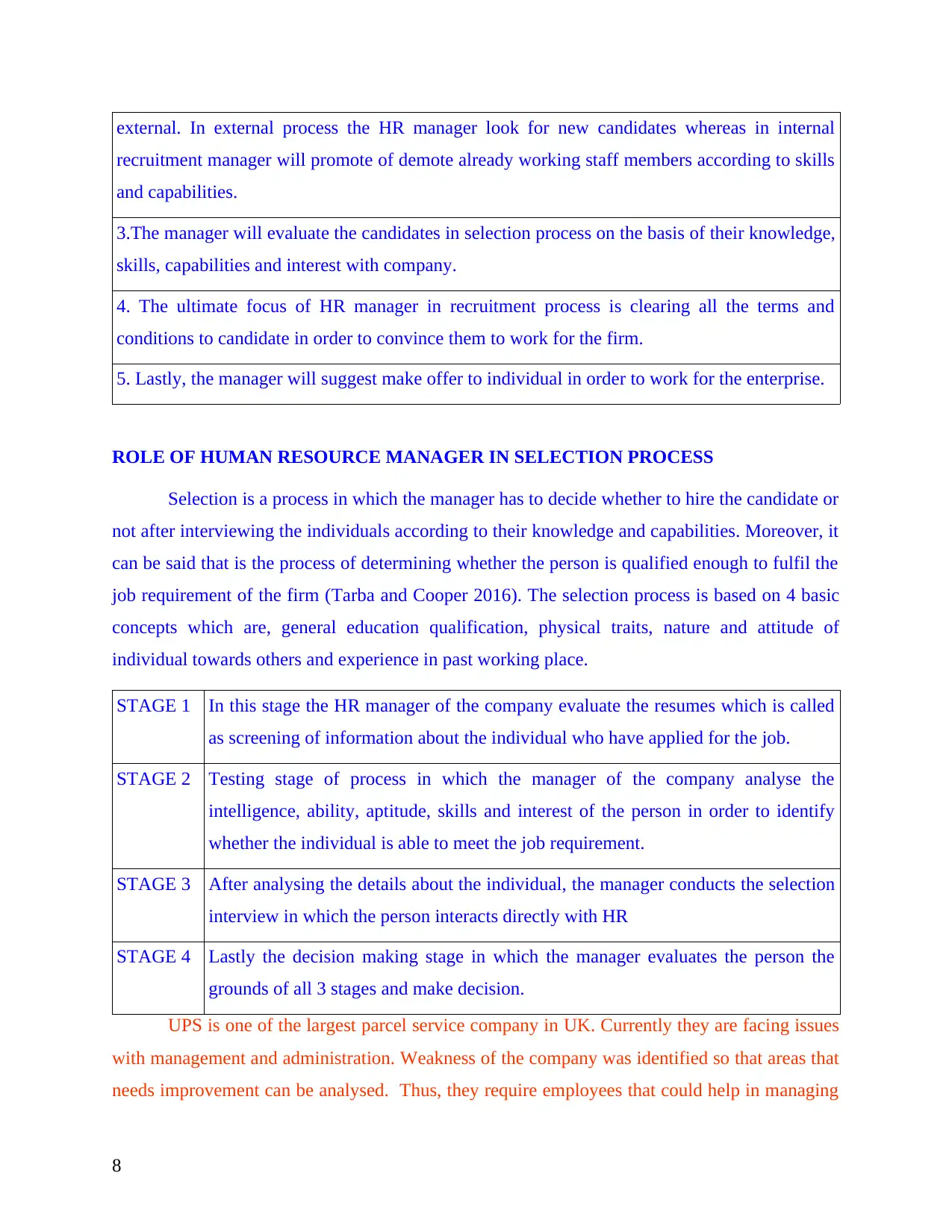
external. In external process the HR manager look for new candidates whereas in internal
recruitment manager will promote of demote already working staff members according to skills
and capabilities.
3.The manager will evaluate the candidates in selection process on the basis of their knowledge,
skills, capabilities and interest with company.
4. The ultimate focus of HR manager in recruitment process is clearing all the terms and
conditions to candidate in order to convince them to work for the firm.
5. Lastly, the manager will suggest make offer to individual in order to work for the enterprise.
ROLE OF HUMAN RESOURCE MANAGER IN SELECTION PROCESS
Selection is a process in which the manager has to decide whether to hire the candidate or
not after interviewing the individuals according to their knowledge and capabilities. Moreover, it
can be said that is the process of determining whether the person is qualified enough to fulfil the
job requirement of the firm (Tarba and Cooper 2016). The selection process is based on 4 basic
concepts which are, general education qualification, physical traits, nature and attitude of
individual towards others and experience in past working place.
STAGE 1 In this stage the HR manager of the company evaluate the resumes which is called
as screening of information about the individual who have applied for the job.
STAGE 2 Testing stage of process in which the manager of the company analyse the
intelligence, ability, aptitude, skills and interest of the person in order to identify
whether the individual is able to meet the job requirement.
STAGE 3 After analysing the details about the individual, the manager conducts the selection
interview in which the person interacts directly with HR
STAGE 4 Lastly the decision making stage in which the manager evaluates the person the
grounds of all 3 stages and make decision.
UPS is one of the largest parcel service company in UK. Currently they are facing issues
with management and administration. Weakness of the company was identified so that areas that
needs improvement can be analysed. Thus, they require employees that could help in managing
8
recruitment manager will promote of demote already working staff members according to skills
and capabilities.
3.The manager will evaluate the candidates in selection process on the basis of their knowledge,
skills, capabilities and interest with company.
4. The ultimate focus of HR manager in recruitment process is clearing all the terms and
conditions to candidate in order to convince them to work for the firm.
5. Lastly, the manager will suggest make offer to individual in order to work for the enterprise.
ROLE OF HUMAN RESOURCE MANAGER IN SELECTION PROCESS
Selection is a process in which the manager has to decide whether to hire the candidate or
not after interviewing the individuals according to their knowledge and capabilities. Moreover, it
can be said that is the process of determining whether the person is qualified enough to fulfil the
job requirement of the firm (Tarba and Cooper 2016). The selection process is based on 4 basic
concepts which are, general education qualification, physical traits, nature and attitude of
individual towards others and experience in past working place.
STAGE 1 In this stage the HR manager of the company evaluate the resumes which is called
as screening of information about the individual who have applied for the job.
STAGE 2 Testing stage of process in which the manager of the company analyse the
intelligence, ability, aptitude, skills and interest of the person in order to identify
whether the individual is able to meet the job requirement.
STAGE 3 After analysing the details about the individual, the manager conducts the selection
interview in which the person interacts directly with HR
STAGE 4 Lastly the decision making stage in which the manager evaluates the person the
grounds of all 3 stages and make decision.
UPS is one of the largest parcel service company in UK. Currently they are facing issues
with management and administration. Weakness of the company was identified so that areas that
needs improvement can be analysed. Thus, they require employees that could help in managing
8
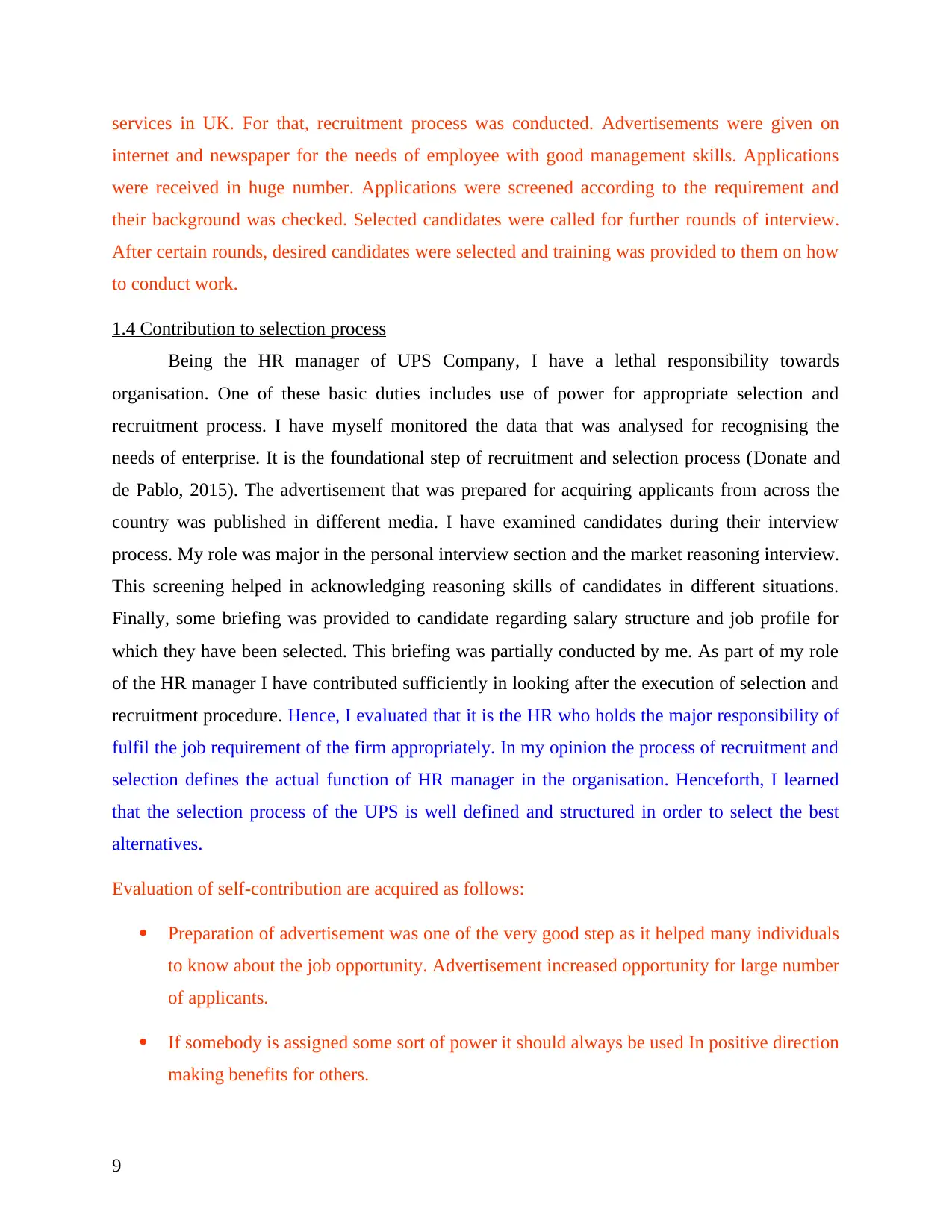
services in UK. For that, recruitment process was conducted. Advertisements were given on
internet and newspaper for the needs of employee with good management skills. Applications
were received in huge number. Applications were screened according to the requirement and
their background was checked. Selected candidates were called for further rounds of interview.
After certain rounds, desired candidates were selected and training was provided to them on how
to conduct work.
1.4 Contribution to selection process
Being the HR manager of UPS Company, I have a lethal responsibility towards
organisation. One of these basic duties includes use of power for appropriate selection and
recruitment process. I have myself monitored the data that was analysed for recognising the
needs of enterprise. It is the foundational step of recruitment and selection process (Donate and
de Pablo, 2015). The advertisement that was prepared for acquiring applicants from across the
country was published in different media. I have examined candidates during their interview
process. My role was major in the personal interview section and the market reasoning interview.
This screening helped in acknowledging reasoning skills of candidates in different situations.
Finally, some briefing was provided to candidate regarding salary structure and job profile for
which they have been selected. This briefing was partially conducted by me. As part of my role
of the HR manager I have contributed sufficiently in looking after the execution of selection and
recruitment procedure. Hence, I evaluated that it is the HR who holds the major responsibility of
fulfil the job requirement of the firm appropriately. In my opinion the process of recruitment and
selection defines the actual function of HR manager in the organisation. Henceforth, I learned
that the selection process of the UPS is well defined and structured in order to select the best
alternatives.
Evaluation of self-contribution are acquired as follows:
Preparation of advertisement was one of the very good step as it helped many individuals
to know about the job opportunity. Advertisement increased opportunity for large number
of applicants.
If somebody is assigned some sort of power it should always be used In positive direction
making benefits for others.
9
internet and newspaper for the needs of employee with good management skills. Applications
were received in huge number. Applications were screened according to the requirement and
their background was checked. Selected candidates were called for further rounds of interview.
After certain rounds, desired candidates were selected and training was provided to them on how
to conduct work.
1.4 Contribution to selection process
Being the HR manager of UPS Company, I have a lethal responsibility towards
organisation. One of these basic duties includes use of power for appropriate selection and
recruitment process. I have myself monitored the data that was analysed for recognising the
needs of enterprise. It is the foundational step of recruitment and selection process (Donate and
de Pablo, 2015). The advertisement that was prepared for acquiring applicants from across the
country was published in different media. I have examined candidates during their interview
process. My role was major in the personal interview section and the market reasoning interview.
This screening helped in acknowledging reasoning skills of candidates in different situations.
Finally, some briefing was provided to candidate regarding salary structure and job profile for
which they have been selected. This briefing was partially conducted by me. As part of my role
of the HR manager I have contributed sufficiently in looking after the execution of selection and
recruitment procedure. Hence, I evaluated that it is the HR who holds the major responsibility of
fulfil the job requirement of the firm appropriately. In my opinion the process of recruitment and
selection defines the actual function of HR manager in the organisation. Henceforth, I learned
that the selection process of the UPS is well defined and structured in order to select the best
alternatives.
Evaluation of self-contribution are acquired as follows:
Preparation of advertisement was one of the very good step as it helped many individuals
to know about the job opportunity. Advertisement increased opportunity for large number
of applicants.
If somebody is assigned some sort of power it should always be used In positive direction
making benefits for others.
9
⊘ This is a preview!⊘
Do you want full access?
Subscribe today to unlock all pages.

Trusted by 1+ million students worldwide
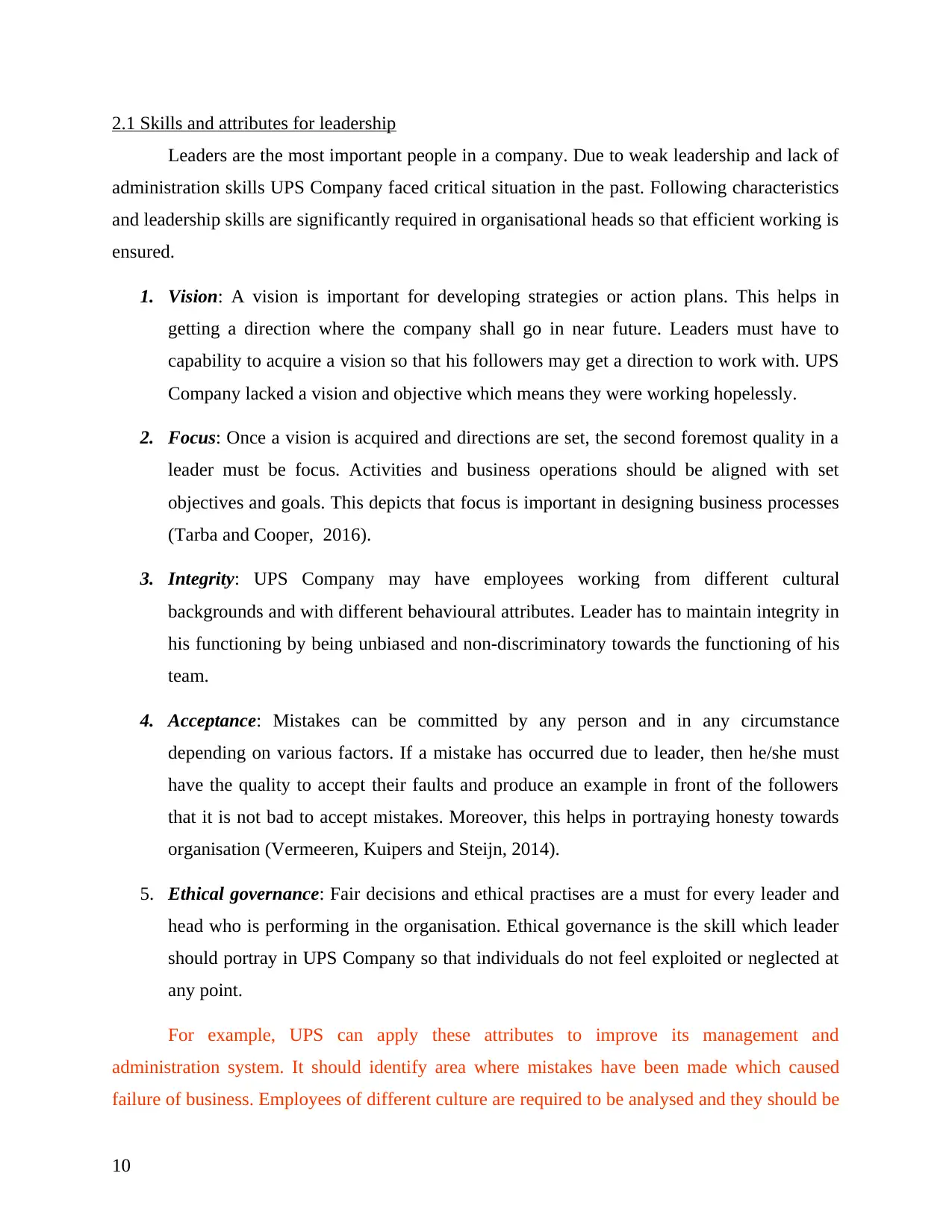
2.1 Skills and attributes for leadership
Leaders are the most important people in a company. Due to weak leadership and lack of
administration skills UPS Company faced critical situation in the past. Following characteristics
and leadership skills are significantly required in organisational heads so that efficient working is
ensured.
1. Vision: A vision is important for developing strategies or action plans. This helps in
getting a direction where the company shall go in near future. Leaders must have to
capability to acquire a vision so that his followers may get a direction to work with. UPS
Company lacked a vision and objective which means they were working hopelessly.
2. Focus: Once a vision is acquired and directions are set, the second foremost quality in a
leader must be focus. Activities and business operations should be aligned with set
objectives and goals. This depicts that focus is important in designing business processes
(Tarba and Cooper, 2016).
3. Integrity: UPS Company may have employees working from different cultural
backgrounds and with different behavioural attributes. Leader has to maintain integrity in
his functioning by being unbiased and non-discriminatory towards the functioning of his
team.
4. Acceptance: Mistakes can be committed by any person and in any circumstance
depending on various factors. If a mistake has occurred due to leader, then he/she must
have the quality to accept their faults and produce an example in front of the followers
that it is not bad to accept mistakes. Moreover, this helps in portraying honesty towards
organisation (Vermeeren, Kuipers and Steijn, 2014).
5. Ethical governance: Fair decisions and ethical practises are a must for every leader and
head who is performing in the organisation. Ethical governance is the skill which leader
should portray in UPS Company so that individuals do not feel exploited or neglected at
any point.
For example, UPS can apply these attributes to improve its management and
administration system. It should identify area where mistakes have been made which caused
failure of business. Employees of different culture are required to be analysed and they should be
10
Leaders are the most important people in a company. Due to weak leadership and lack of
administration skills UPS Company faced critical situation in the past. Following characteristics
and leadership skills are significantly required in organisational heads so that efficient working is
ensured.
1. Vision: A vision is important for developing strategies or action plans. This helps in
getting a direction where the company shall go in near future. Leaders must have to
capability to acquire a vision so that his followers may get a direction to work with. UPS
Company lacked a vision and objective which means they were working hopelessly.
2. Focus: Once a vision is acquired and directions are set, the second foremost quality in a
leader must be focus. Activities and business operations should be aligned with set
objectives and goals. This depicts that focus is important in designing business processes
(Tarba and Cooper, 2016).
3. Integrity: UPS Company may have employees working from different cultural
backgrounds and with different behavioural attributes. Leader has to maintain integrity in
his functioning by being unbiased and non-discriminatory towards the functioning of his
team.
4. Acceptance: Mistakes can be committed by any person and in any circumstance
depending on various factors. If a mistake has occurred due to leader, then he/she must
have the quality to accept their faults and produce an example in front of the followers
that it is not bad to accept mistakes. Moreover, this helps in portraying honesty towards
organisation (Vermeeren, Kuipers and Steijn, 2014).
5. Ethical governance: Fair decisions and ethical practises are a must for every leader and
head who is performing in the organisation. Ethical governance is the skill which leader
should portray in UPS Company so that individuals do not feel exploited or neglected at
any point.
For example, UPS can apply these attributes to improve its management and
administration system. It should identify area where mistakes have been made which caused
failure of business. Employees of different culture are required to be analysed and they should be
10
Paraphrase This Document
Need a fresh take? Get an instant paraphrase of this document with our AI Paraphraser
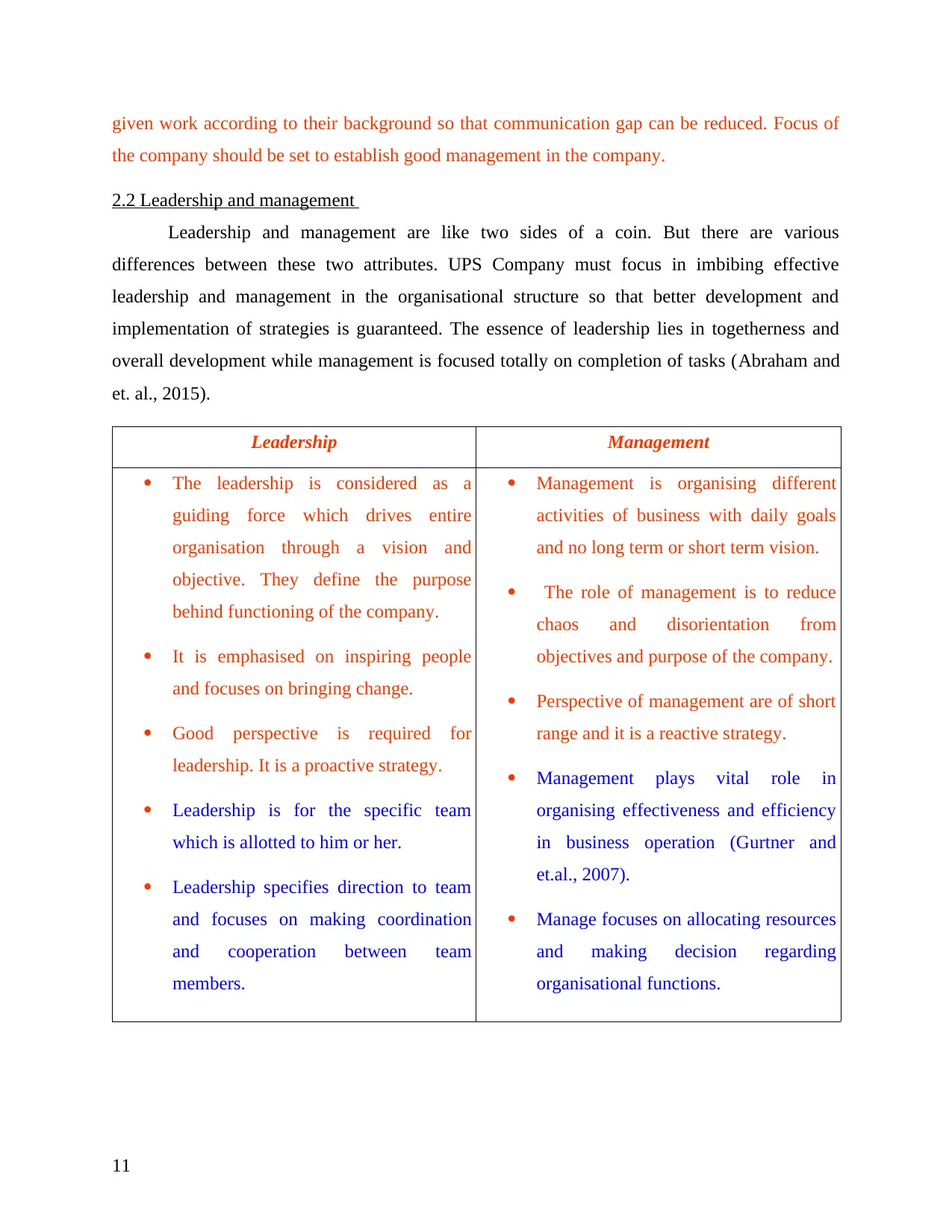
given work according to their background so that communication gap can be reduced. Focus of
the company should be set to establish good management in the company.
2.2 Leadership and management
Leadership and management are like two sides of a coin. But there are various
differences between these two attributes. UPS Company must focus in imbibing effective
leadership and management in the organisational structure so that better development and
implementation of strategies is guaranteed. The essence of leadership lies in togetherness and
overall development while management is focused totally on completion of tasks (Abraham and
et. al., 2015).
Leadership Management
The leadership is considered as a
guiding force which drives entire
organisation through a vision and
objective. They define the purpose
behind functioning of the company.
It is emphasised on inspiring people
and focuses on bringing change.
Good perspective is required for
leadership. It is a proactive strategy.
Leadership is for the specific team
which is allotted to him or her.
Leadership specifies direction to team
and focuses on making coordination
and cooperation between team
members.
Management is organising different
activities of business with daily goals
and no long term or short term vision.
The role of management is to reduce
chaos and disorientation from
objectives and purpose of the company.
Perspective of management are of short
range and it is a reactive strategy.
Management plays vital role in
organising effectiveness and efficiency
in business operation (Gurtner and
et.al., 2007).
Manage focuses on allocating resources
and making decision regarding
organisational functions.
11
the company should be set to establish good management in the company.
2.2 Leadership and management
Leadership and management are like two sides of a coin. But there are various
differences between these two attributes. UPS Company must focus in imbibing effective
leadership and management in the organisational structure so that better development and
implementation of strategies is guaranteed. The essence of leadership lies in togetherness and
overall development while management is focused totally on completion of tasks (Abraham and
et. al., 2015).
Leadership Management
The leadership is considered as a
guiding force which drives entire
organisation through a vision and
objective. They define the purpose
behind functioning of the company.
It is emphasised on inspiring people
and focuses on bringing change.
Good perspective is required for
leadership. It is a proactive strategy.
Leadership is for the specific team
which is allotted to him or her.
Leadership specifies direction to team
and focuses on making coordination
and cooperation between team
members.
Management is organising different
activities of business with daily goals
and no long term or short term vision.
The role of management is to reduce
chaos and disorientation from
objectives and purpose of the company.
Perspective of management are of short
range and it is a reactive strategy.
Management plays vital role in
organising effectiveness and efficiency
in business operation (Gurtner and
et.al., 2007).
Manage focuses on allocating resources
and making decision regarding
organisational functions.
11
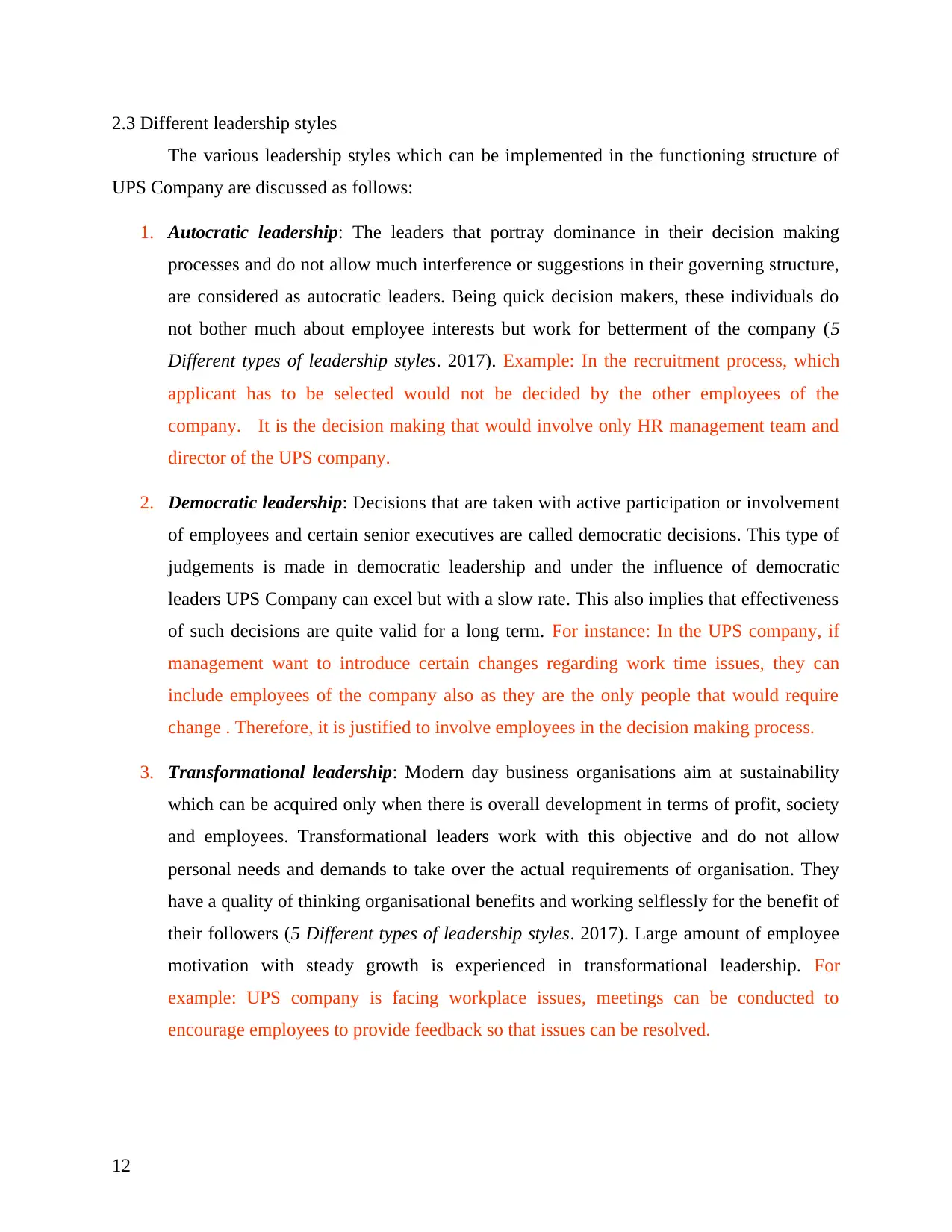
2.3 Different leadership styles
The various leadership styles which can be implemented in the functioning structure of
UPS Company are discussed as follows:
1. Autocratic leadership: The leaders that portray dominance in their decision making
processes and do not allow much interference or suggestions in their governing structure,
are considered as autocratic leaders. Being quick decision makers, these individuals do
not bother much about employee interests but work for betterment of the company (5
Different types of leadership styles. 2017). Example: In the recruitment process, which
applicant has to be selected would not be decided by the other employees of the
company. It is the decision making that would involve only HR management team and
director of the UPS company.
2. Democratic leadership: Decisions that are taken with active participation or involvement
of employees and certain senior executives are called democratic decisions. This type of
judgements is made in democratic leadership and under the influence of democratic
leaders UPS Company can excel but with a slow rate. This also implies that effectiveness
of such decisions are quite valid for a long term. For instance: In the UPS company, if
management want to introduce certain changes regarding work time issues, they can
include employees of the company also as they are the only people that would require
change . Therefore, it is justified to involve employees in the decision making process.
3. Transformational leadership: Modern day business organisations aim at sustainability
which can be acquired only when there is overall development in terms of profit, society
and employees. Transformational leaders work with this objective and do not allow
personal needs and demands to take over the actual requirements of organisation. They
have a quality of thinking organisational benefits and working selflessly for the benefit of
their followers (5 Different types of leadership styles. 2017). Large amount of employee
motivation with steady growth is experienced in transformational leadership. For
example: UPS company is facing workplace issues, meetings can be conducted to
encourage employees to provide feedback so that issues can be resolved.
12
The various leadership styles which can be implemented in the functioning structure of
UPS Company are discussed as follows:
1. Autocratic leadership: The leaders that portray dominance in their decision making
processes and do not allow much interference or suggestions in their governing structure,
are considered as autocratic leaders. Being quick decision makers, these individuals do
not bother much about employee interests but work for betterment of the company (5
Different types of leadership styles. 2017). Example: In the recruitment process, which
applicant has to be selected would not be decided by the other employees of the
company. It is the decision making that would involve only HR management team and
director of the UPS company.
2. Democratic leadership: Decisions that are taken with active participation or involvement
of employees and certain senior executives are called democratic decisions. This type of
judgements is made in democratic leadership and under the influence of democratic
leaders UPS Company can excel but with a slow rate. This also implies that effectiveness
of such decisions are quite valid for a long term. For instance: In the UPS company, if
management want to introduce certain changes regarding work time issues, they can
include employees of the company also as they are the only people that would require
change . Therefore, it is justified to involve employees in the decision making process.
3. Transformational leadership: Modern day business organisations aim at sustainability
which can be acquired only when there is overall development in terms of profit, society
and employees. Transformational leaders work with this objective and do not allow
personal needs and demands to take over the actual requirements of organisation. They
have a quality of thinking organisational benefits and working selflessly for the benefit of
their followers (5 Different types of leadership styles. 2017). Large amount of employee
motivation with steady growth is experienced in transformational leadership. For
example: UPS company is facing workplace issues, meetings can be conducted to
encourage employees to provide feedback so that issues can be resolved.
12
⊘ This is a preview!⊘
Do you want full access?
Subscribe today to unlock all pages.

Trusted by 1+ million students worldwide
1 out of 20
Related Documents
Your All-in-One AI-Powered Toolkit for Academic Success.
+13062052269
info@desklib.com
Available 24*7 on WhatsApp / Email
![[object Object]](/_next/static/media/star-bottom.7253800d.svg)
Unlock your academic potential
Copyright © 2020–2026 A2Z Services. All Rights Reserved. Developed and managed by ZUCOL.





